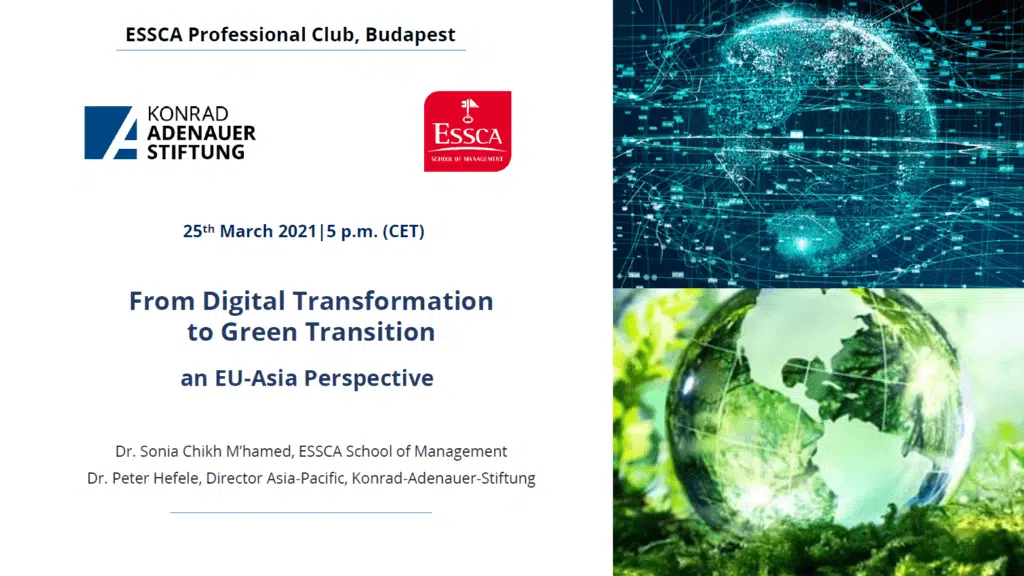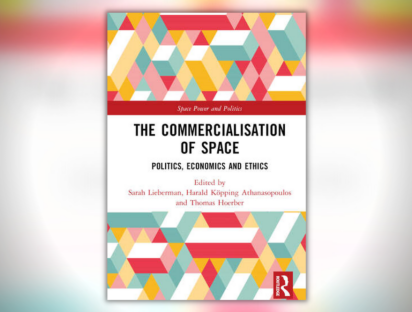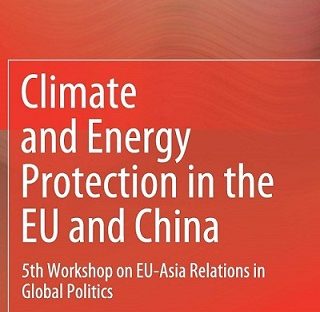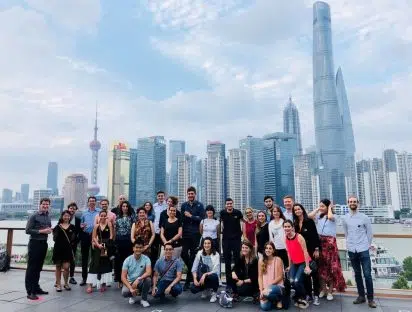An EU-Asia Perspective.
Webinar organized by ESSCA Budapest
25th March 2021, 5 p.m. on Teams
Presented by Dr Sonia Chikh M’hamed, from ESSCA School of Management, Shanghai, and Dr Peter Hefele, head of the Department Asia and the Pacific of Konrad-Adenauer-Stiftung (KAS), Berlin, on the 25th of March 2021. The webinar “From Digital Transformation to Green Transition – an EU*Asia Perspective” was based on insights from Dr Peter Hefele’s personal experience in Asia over the last 10 years, recent empirical studies on “Digitalisation and Innovation” conducted in seven Asian countries in 2020 and 2021 by KAS office in Singapore, and the first results of an ongoing research project on “The European Green Deal – Perspectives for EU-Asia Relationship”, funded by KAS.

Dr Peter Hefele © KAS
The KAS study “Digitalisation and Innovation” focuses both on highly industrial countries as well as emerging countries, and with different political systems in Asia. This project is not primarily about green transformation -, or what Dr Peter Hefele referred to as sustainability as this term includes also social dimensions -, but it provides interesting insights and concepts on the use of digital technologies. Among Asia, one can observe great openness to digitalisation and hopes as a solution to a wide range of challenges such as health, education, ecology, or even policy. But it also became clear that trust and reliable regulation are key to broader acceptance among the population. Upon these insights, conclusions for a successful green transition can be drawn. Despite the importance of governments in innovations processes, the creativity of enterprises, local entities and civil societies remains a major resource of transformation.

Dr Sonia Chikh M’hamed
The research project on the European Green Deal, presented by Dr Sonia Chikh M’hamed, explores sustainability initiatives in four Asian countries (China, India, Singapore and Japan) and maps potential areas of cooperation between the EU and Asia-Pacific Dr Chikh M’hamed stated that the EU Green Deal will not be feasible without substantial external partnerships. The national economies of the Asia-Pacific region remain the most dynamic and some Asian countries have similarly announced their long-term objectives such as carbon neutrality by 2050 in Japan or the Singapore Green Plan 2030. In this qualitative research, which brings together high-level experts from concerned countries and EU institutions, they found out that the concept of sustainability in Asia-Pacific is rather new and remains quite diverse, reflecting the diversity across the region. The study has revealed diverse priorities in Asia-Pacific with regards to the country characteristics and various green growth strategies. If it comes to green transformation, there is still a big gap between promises and reality, i.e. between long-term goals (Japan 2050 / China 2060) and short/medium-term policies, such as the increase of emissions till 2030 or the use of fossil energy sources. In the current situation, for Asia-Pacific as for the EU, fast economic recovery after COVID-19 is a top priority, which might thwart strategies of the green transition. She detected several potential areas of cooperation and stated that creating positive or negative incentives is key in the EU’s external policy. The social dimension of the transition is among the key elements to a successful green transition in Asia. But many questions remain and the discussion is still open as more elements have to be taken into account to consolidate the Green Transition Strategy. Against this background, it is obvious that we need to collaborate more in creating sustainable societies as challenges and risks are global. For more information, see the abstract including the biographies of the speakers





